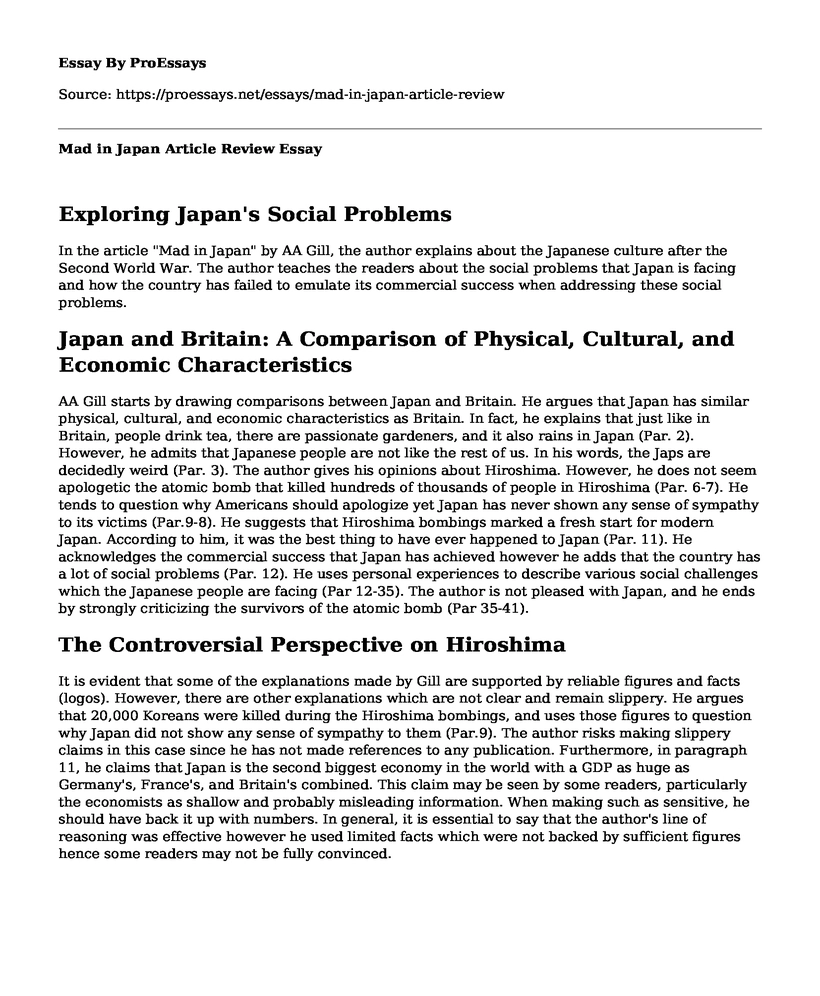Exploring Japan's Social Problems
In the article "Mad in Japan" by AA Gill, the author explains about the Japanese culture after the Second World War. The author teaches the readers about the social problems that Japan is facing and how the country has failed to emulate its commercial success when addressing these social problems.
Japan and Britain: A Comparison of Physical, Cultural, and Economic Characteristics
AA Gill starts by drawing comparisons between Japan and Britain. He argues that Japan has similar physical, cultural, and economic characteristics as Britain. In fact, he explains that just like in Britain, people drink tea, there are passionate gardeners, and it also rains in Japan (Par. 2). However, he admits that Japanese people are not like the rest of us. In his words, the Japs are decidedly weird (Par. 3). The author gives his opinions about Hiroshima. However, he does not seem apologetic the atomic bomb that killed hundreds of thousands of people in Hiroshima (Par. 6-7). He tends to question why Americans should apologize yet Japan has never shown any sense of sympathy to its victims (Par.9-8). He suggests that Hiroshima bombings marked a fresh start for modern Japan. According to him, it was the best thing to have ever happened to Japan (Par. 11). He acknowledges the commercial success that Japan has achieved however he adds that the country has a lot of social problems (Par. 12). He uses personal experiences to describe various social challenges which the Japanese people are facing (Par 12-35). The author is not pleased with Japan, and he ends by strongly criticizing the survivors of the atomic bomb (Par 35-41).
The Controversial Perspective on Hiroshima
It is evident that some of the explanations made by Gill are supported by reliable figures and facts (logos). However, there are other explanations which are not clear and remain slippery. He argues that 20,000 Koreans were killed during the Hiroshima bombings, and uses those figures to question why Japan did not show any sense of sympathy to them (Par.9). The author risks making slippery claims in this case since he has not made references to any publication. Furthermore, in paragraph 11, he claims that Japan is the second biggest economy in the world with a GDP as huge as Germany's, France's, and Britain's combined. This claim may be seen by some readers, particularly the economists as shallow and probably misleading information. When making such as sensitive, he should have back it up with numbers. In general, it is essential to say that the author's line of reasoning was effective however he used limited facts which were not backed by sufficient figures hence some readers may not be fully convinced.
Analyzing the Effectiveness of Logos, Pathos, and Ethos in AA Gill's Writing
Gill's choice of emotional appeals (Pathos) is very fascinating. He introduces the first paragraphs (Par. 1-5) with an appeal to humor. In fact, in Paragraph 4, he uses humor at the end where he explains that Japanese heated loo seats are very addictive and even makes a person question his/her sexual orientation, or wish for diarrhea. As he moves on, his emotions change from hilarity to seriousness. In paragraph 14, he expresses his disappointment in Kyoto city but acknowledges that he liked the city's gardens. Nonetheless, the author is very angry with the "shamed-based" culture which Japan has embraced. He ridicules some of the practices conducted in Japan but allows his readers to understand there is a room for change.
It is true that the author gives an impression of a holistic character (ethos) with his mixture of tones. He first appears as an outgoing and friendly person, with a casual style, using colloquial language such as "they drink tea, we drink tea." Furthermore, he uses sarcasm and funny tones when talking about more serious things he experienced in Japan. For instance, he argues that "if religions were cars, Shinto would be a wheelbarrow" to explain how religion is one of the key reasons why Japan has social problems (Par. 15). Also, the author sounds brave in the sense that he is not afraid to express his radical opinions, for example, he explained that "No country hides behind the paper screen of cultural elitism like Japan" (Par. 18). In general, multiple personas including funny, sarcastic, and brave persona emerge from his work.
Work Cited
"Mad In Japan - An Entertaining Read (Via @Brodiegal )." Spillly. N.p., 2018. Web. 3 Apr. 2018.
Cite this page
Mad in Japan Article Review. (2022, Mar 11). Retrieved from https://proessays.net/essays/mad-in-japan-article-review
If you are the original author of this essay and no longer wish to have it published on the ProEssays website, please click below to request its removal:
- The Passage on Royalty by Anita - Paper Example
- Pop Culture Essay on Beyonce the Singer
- Hate Groups and Extremism Essay Example
- Pima Creation Story Essay Example
- Research Paper on 60s Psychedelic Movement: Revolutionizing Pop Culture
- Ads, Culture, and Race: America's Diversity Revolutionized by Ads - Essay Sample
- Political System: Impact on Citizens Within a Country's Borders - Essay Sample







